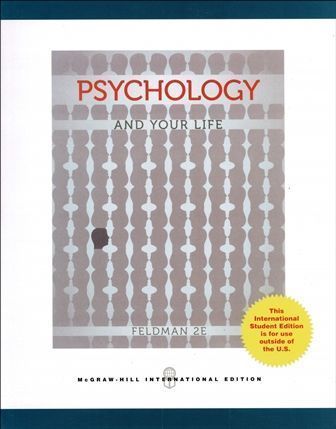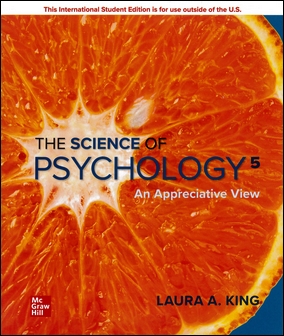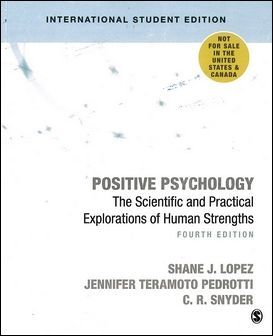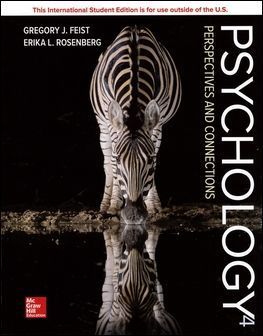書籍分類

Psychology and Your Life 2/e
作者:Robert Feldman
原價:NT$ 1,250
ISBN:9781259072550
版次:2
年份:2013
出版商:McGraw-Hill
頁數/規格:621頁/平裝彩色
版次:2
年份:2013
出版商:McGraw-Hill
頁數/規格:621頁/平裝彩色
內容介紹 本書特色 目錄 作者介紹
- Description
Psychology Matters. Robert Feldman’s Psychology and Your Life 2e draws students in immediately by connecting psychology to their professional and personal lives. Emphasizing practical application, Psychology and Your Life 2e offers examples and perspectives from healthcare occupations, nursing, technology, criminal justice, legal, and business, among others to prepare students and help them apply psychology throughout their lives and careers.
A fully-integrated supplements package helps instructors objectively gauge their students’ mastery of psychology’s key principles and concepts and create dynamic class experiences—whether in the classroom or online. All ancillary materials are organized by the measurable learning outcomes for each module within the text—there is no more wondering whether the text in use will meet the accreditation guidelines for schools!
- Key Features
- “From the Perspective of” highlights how psychology impacts a variety of professions. Created to show the correlation between psychology and different professions, students learn to comprehend what psychology means to their chosen program of study and answers the “why does psychology matter to me” question. Whether students are in an Allied Health, Nursing, criminal justice, technology, business, or legal studies track, they will have the chance to make connections between their area of study and their lives after completing their program.
- Try It! Experiential self-assessment quizzes reinforce chapter concepts and enable students to consider, compare, and contrast their preferences, behaviors, and attitudes. Similar to the fun quizzes students may take online or in magazines, the Try It! boxes are self-assessment quizzes that tie directly to and reinforce the chapter concepts in a non-threatening (even fun!) manner. Active learning at its best!
- McGraw-Hill’s Connect Psychology—web-based assignment and assessment platform that gives students the means to better connect with their coursework, with their instructors, and with the important concepts that they will need to know for success now and in the future. With Connect: Psychology, instructors can deliver assignments, quizzes, and tests easily online. Students can practice important skills at their own pace and on their own schedule. With Connect: Psychology Plus, students also get 24/7 online access to an e-book—an online edition of the text—to aid them in successfully completing their work, wherever and whenever they choose.
- LearnSmart—adaptive diagnostic tool provides a GPS for learning and studying more efficiently, Feldman ensures that every student gains a better understanding of psychology. This groundbreaking adaptive diagnostic tool generates a personalized study plan to help students “know what they know” while guiding them to understand and learn what they don’t know through engaging interactivities, exercises, and readings. LearnSmart is available within McGraw-Hill’s Connect Psychology!
- Becoming an Informed Consumer of Psychology—psychology concepts are discussed in the context of the student as a consumer. These real-life scenarios enable students to consider and even implement psychological concepts within the world around them and apply critical thinking skills to their personal and professional lives. This feature includes scenarios such as how to evaluate advertising, and how to determine if one should seek counseling.
- Study Alert—study tips tied into chapter content promote positive learning behaviors within the context of psychology. Students can prepare and apply the learned skills in their current course. Provides additional information to help students understand tough or confusing concepts and provides guidance for what information will follow later in each chapter.
- Student friendly design and layout created to capture students' attention and enhance student engagement. Students will find the stunning images, charts, and photos throughout this innovative learning tool easy to digest and relate to.
- Modular Format—the successful modular format of Psychology and Your Life offers modules within chapters—both manageable for students, and flexible for instructors who wish to assign complete chapters.
- Exploring Diversity—strategically placed within the modules, exploring diversity addresses how diversity and perspective relate to the study of psychology. Exploring Diversity promotes critical thinking about psychology concepts through the discussion and assessment of cultural and ethnic differences in direct correlation to research, study, and our lives.
- Asset Map—makes class prep quick and easy! Each asset map identifies the chapter and learning objectives and ties those to the associated instructor notes, PowerPoint slides, and Test Bank questions. The asset map takes the guesswork out of planning lectures and online sessions!
- Case Studies—found at the end of each chapter, allow students to apply and analyze the chapter content and discuss what they have learned in the context of a story or situation. Students will analyze a situation through critical thinking, discussion, and interaction with other students whose perspectives may differ from their own.
- Full Circle—end-of-chapter map that identifies the correlation of the overarching chapter key concepts. Visual learners will benefit from the Chapter Maps which “tie everything together” by revisiting and reinforcing the key concepts for every module within each chapter.
- Recap/Evaluate/Rethink—end-of-module activities are tied directly to the module’s learning outcomes boosting students’ opportunities to apply and analyze their knowledge beyond the definitions or simple explanations. These activities allow instructors to move students from memorization to application and analysis in a cohesive, logical manner through a variety of activities and exercises tied to the learning outcomes of the module. Instructors who are familiar with Bloom’s Taxonomy or who want to provide activities for students with different learning styles will find a variety of exercises for homework or class discussion.
- Looking Forward/Looking Back—introduces the key concepts of every chapter; Looking Back summarizes content from the chapter as a whole to reinforce the learning outcomes of each module. (For a visual representation of the Looking Back Feature, see the explanation of the Full Circle feature). Looking Forward introduces each chapter so students can examine the overarching chapter concepts. Looking Back provides them with an overall chapter summary, restating what they should have learned during their chapter review.
- Psychology on the Web consists of various web-based activities found at the end of every chapter to promote internet research of key chapter concepts. Great for active learning and increasing students’ abilities to conduct internet research and critique internet resources within the context of their psychology class!
- NEW! Profiles of Success—short profiles designed to spotlight successful people who use the principles of psychology in their professional lives. These profiles help students to understand and visualize the importance of psychology in multiple careers paths.
- NEW! Psychology and Your Life, P.O.W.E.R Version (ISBN 0-077-52792-5)—takes the connection between psychology and students' lives one step further by supplementing the core content with Feldman’s highly successful P.O.W.E.R. student success model. Psychology and Your Life: P.O.W.E.R. Version combines the support of proven student success pedagogy and a highly applied approach to psychology.
-
Correlation Guide:www.mhhe.com/mhcp/CorrelationGuides/TS_Psychological_Issues_17e.pdf
This convenient guide matches the issues in Taking Sides: Clashing Views on Psychological Issues, 17/e with the corresponding chapters in three of our best-selling McGraw-Hill Psychology textbooks by Feldman, Lahey, and Feist/Rosenberg. -
Correlation Guide:www.mhhe.com/mhcp/CorrelationGuides/AE_Psychology_1213.pdf
This convenient guide matches the units in Annual Editions: Psychology 12/13 with the corresponding chapters in three of our best-selling McGraw-Hill Psychology textbooks by Feldman, Lahey, and Feist/Rosenberg. - CREATE, our Custom Textbook Option Craft your teaching resources to match the way you teach! With McGraw-Hill Create, www.mcgrawhillcreate.com, you can easily rearrange chapters, combine material from other sources, and upload content you have written like your course syllabus or teaching notes. Find the content you need by searching through thousands of MHE titles and personalize your book’s appearance by selecting the cover and adding your name, school, and course information. Order a Create book and receive a complimentary print review copy in 3–5 business days or a complimentary electronic review copy (eComp) via email in about an hour. Go to www.mcgrawhillcreate.com today and register. Experience how McGraw-Hill Create empowers you to teach your students your way.
- MHCampus™ is a new one-stop teaching and learning experience available to users of any learning management system. This institutional service allows faculty and students to enjoy single sign-on (SSO) access to all McGraw-Hill Higher Education materials, including Connect, from directly within the institution’s website. MHCampus™ provides faculty with instant access to all MHHE teaching materials (e.g. ebooks, test banks, PowerPoint slides, animations and learning objects, etc), allowing them to browse, search, and use any instructor ancillary content in our vast library at no additional cost. Students enjoy SSO access to a variety of free and subscription based products. With this program enabled, faculty and students will never need to create another account to access McGraw-Hill products and services. Learn more at www.mhcampus.com.
- Blackboard Partnership – McGraw-Hill and Blackboard have teamed up to simplify your life. Now you and your students can access Connect Plus and Create right from within your Blackboard course – all with one single sign-on. The gradebooks are seamless, so when a student completes an integrated Connect Plus assignment, the grade for that assignment automatically (and instantly) feeds your Blackboard grade center. Learn more at www.domorenow.com.
-
Correlation Guide:www.mhhe.com/mhcp/CorrelationGuides/TS_Psychological_Issues_17eX.pdf
This convenient guide matches the issues in Taking Sides: Clashing Views on Psychological Issues, 17/e Expanded with the corresponding chapters in three of our best-selling McGraw-Hill Psychology textbooks by Feldman, Lahey, and Feist/Rosenberg. -
Correlation Guide:www.mhhe.com/mhcp/CorrelationGuides/AE_Psychology_13_14.pdf
This convenient guide matches the units in Annual Editions: Psychology 13/14 with the corresponding chapters in three of our best-selling McGraw-Hill Psychology textbooks by Feldman, Lahey, and Feist/Rosenberg. -
Correlation Guide:www.mhhe.com/mhcp/CorrelationGuides/TS_Psychological_Issues_18e.pdf
This convenient guide matches the issues in Taking Sides: Clashing Views on Psychological Issues, 18/e with the corresponding chapters in three of our best-selling McGraw-Hill Education Psychology textbooks by Feldman, Lahey, and Feist/Rosenberg. -
Correlation Guide:www.mhhe.com/mhcp/CorrelationGuides/AE_Psychology_45e.pdf
This convenient guide matches the articles in Annual Editions: Psychology, 45/e with the corresponding chapters in three of our best-selling McGraw-Hill Psychology textbooks by King, Feldman, and Lahey.
New Features
- Table of Contents
Chapter 1: Introduction to Psychology
Chapter 2: Neuroscience and Behavior
Chapter 3: Sensation and Perception
Chapter 4: States of Consciousness
Chapter 5: Learning
Chapter 6: Thinking, Memory, Cognition, and Language
Chapter 7: Motivation and Emotion
Chapter 8: Development
Chapter 9: Personality and Individual Differences
Chapter 10: Psychological Disorders
Chapter. 11: Treatment of Psychological Disorders
Chapter 12: Social Psychology
- Robert Feldman
Bob Feldman still remembers those moments of being overwhelmed when he started college at Wesleyan University. “I wondered whether I was up to the challenges that faced me,” he recalls, “and—although I never would have admitted it at the time—I really had no idea what it took to be successful at college.”
That experience, along with his encounters with many students during his own teaching career, led to a life-long interest in helping students navigate the critical transition that they face at the start of their own college careers. Professor Feldman, who went on to receive a doctorate in psychology from the University of Wisconsin–Madison, is now Deputy Chancellor and Professor of Psychological and Brain Sciences at the University of Massachusetts Amherst. He is founding director of POWER Up for Student Success, the first-year experience course for incoming students.
Professor Feldman’s proudest professional accomplishment is winning the College Outstanding Teaching Award at UMass. He also has been named a Hewlett Teaching Fellow and was Senior Online Instruction Fellow. He has taught courses at Mount Holyoke College, Wesleyan University, and Virginia Commonwealth University. Professor Feldman is a Fellow of the American Psychological Association, the Association for Psychological Science, and the American Association for the Advancement of Science. He is a winner of a Fulbright Senior Research Scholar and Lecturer award and has written over 200 scientific articles, book chapters, and books. His books, some of which have been translated into Spanish, French, Portuguese, Dutch, Japanese, and Chinese, include Improving the First Year of College: Research and Practice; Understanding Psychology, 12/e; and Development Across the Life Span, 7/e. His research interests encompass the study of honesty and truthfulness in everyday life, development of nonverbal behavior in children, and the social psychology of education. His research has been supported by grants from the National Institute of Mental Health and the National Institute on Disabilities and Rehabilitation Research.
With the last of his three children completing college, Professor Feldman occupies his spare time with pretty decent cooking and earnest, but admittedly unpolished, piano playing. He also loves to travel. He lives with his wife, who is an educational psychologist, in a home overlooking the Holyoke mountain range in western Massachusetts.







